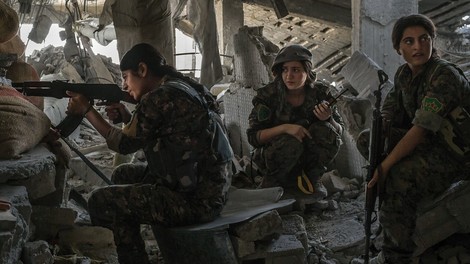Your podcast discovery platform
Curious minds select the most fascinating podcasts from around the world. Discover hand-piqd audio recommendations on your favorite topics.

piqer for: Globalization and politics Global finds
Sezin Öney, originally from Turkey, is based in Budapest and Istanbul. She her journalism career as a foreign news reporter in 1999 and she turned into political analysis as a columnist since 2007. Her interest in her main academic subject area of populism was sparked almost decade ago; and now she focuses specifically on populist leadership, and populism in Turkey and Hungary. She studied international relations, nationalism, international law, Jewish history, comparative politics and discourse analysis across Europe.
Dark Victory In Raqqa
This is the most perceptive article yet written on the Kurdish forces; specifically the Kurdish female fighters who fought for regaining control of the city of Raqqa from ISIS. The author, Luke Mogelson, interviewed members of the Democratic Union Party’s militia, the YPG, encircling Raqqa in August, and he provides insight into their backgrounds, stances, expectations and an overall perception of what's next for the city and the region now that it has been freed from ISIS. Inter alia, focus of the article is on the female fighters of the YPG, who are either over-romanticized or demonized in journalistic works. On the one hand, these female fighters have even inspired the fashion world; they have been portrayed as women warriors battling the dark radical zealousness of the ISIS. On the other hand, in neighboring countries like Turkey, the linkage between the YPG and the armed insurgent Kurdish group PKK, has led to their branding as terrorists. There were peace negotiations between the Turkish government and the PKK until 2015; but in July 2015, violence re-erupted on a major scale.
Addressing this thorny subject, the objective approach of Mogelson aiming to grasp the phenomenon of the YPG (with whom the US forces closely cooperated during the siege of Raqqa) is commendable.
As always, reality is multi-faceted, and violence and clashes over power take their tolls on the people. A male YPG fighter Mogelson interviewed, 33 year old Ali Sher, gives clues regarding the depth of deprivation omnipresent in the region.
“Think about this society,” Sher said. “If you’re married here, what can you give your children? Clothes? Food? Even slaves have clothes and food. When you are resisting oppression and injustice, you are fighting for more than just your own small family. You are fighting for your big family — society.”
The battle of Raqqa is over, but can the cycle of violence in the region be broken while such deprivation endures? It looks unlikely.
